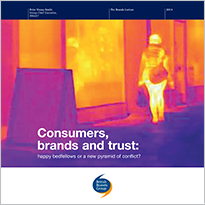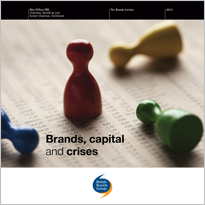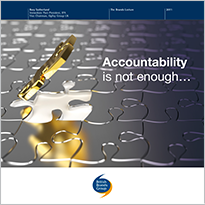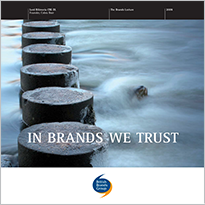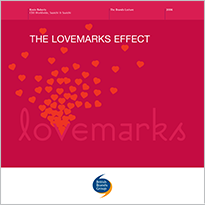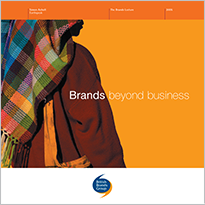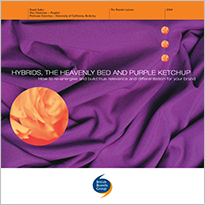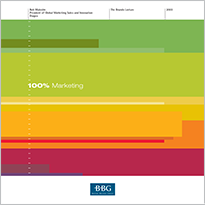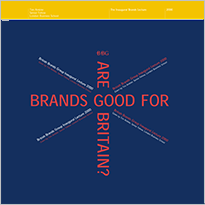The Brands Lectures
The 20th Brands Lecture
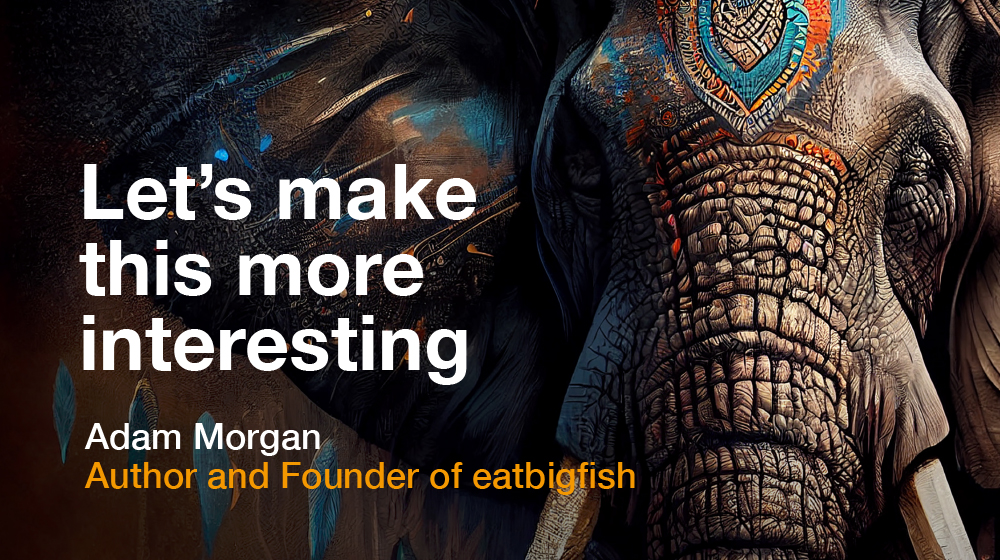
The 20th Brands Lecture
This Brands Lecture was delivered in London by Adam Morgan, author of the seminal book on branding The Big Fish: How challenger brands can compete against brand leaders, in February.
For all that we’ve learnt about marketing effectiveness, the big beige elephant in the marketing room is that most brands and marketing are still unforgivably boring.
But what is the real cost of being Dull for us all? Why are so many smart, well-intentioned people producing such boring communications, inside and outside our organisations?
And what should we be doing about it?
Adam, author and founder of the consultancy eatbigfish, shared the findings of his latest research comprising of a series of interviews with experts in making dull subjects interesting, as well as the results of a collaboration with last year’s Brands Lecturer, Peter Field, on measuring the financial cost of being dull.
The Lecture will be published. Please email us if you wish to be emailed a copy when it is available (estimate: March / April).
The 21st Brands Lecture will be delivered on 1st October by Mark Ritson.
Past lectures
Since the year 2000, the annual Brands Lecture, delivered by leading figures in their field, has been a popular event in our members’ year. Each lecturer has focused on a different aspect of branding or its effects. The following gives a taste of each lecture but you can read the full version by clicking on the links to download transcripts of the event.

The 19th Brands Lecture
Brands – falling in love again
Peter Field, Author and consultant
Average campaign effectiveness levels have declined seriously since around 2008. In his Lecture, Peter offered the fullest explanation yet for this decline, detailing the dangerously seductive thinking and metrics that undermine long-term effectiveness that has led to the neglect of brands. He argues that the support of brands is more important than ever and remains paramount in straightened times, suggesting how marketing should move forward.

Brands are arguably the most pervasive force in the world for business growth but can they also be a force for change, or for good? What role should brands play in an increasingly fractured society? Gary Coombe argues that brands can, and must, have a point of view on the most pressing and often controversial issues in society and be ready and willing to speak up. It’s about the role of brands and business in modern politics and society.
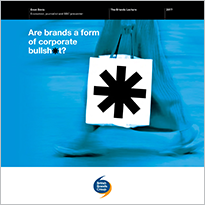
The 17th Brands Lecture
Are brands a form of
corporate bullshit?
Evan Davis, Economist and BBC journalist
Are brands a form of corporate consumer exploitation, or is it possible to explain them as a desirable feature of our economic system? We live in a time of general distrust of business and its motives, and in this talk, Evan Davis asks whether the attention lavished upon brands in modern industrialised economies should be seen as justifying cynicism about companies and their marketing.
The 16th Brands Lecture
Never mind the quality, feel the personalisation.
The future of retailing.
Alan Giles, Said Business School, University of Oxford
Alan looked at the structural changes taking place in retail around the world, the rise of pureplay online competitors, the strategic responses from traditional retailers, innovations in the sector and some thoughts on the future. The lecture is rich in thinking and data and gives brand owners valuable insights into what they should consider as they plan both their offer and their routes to the consumer in order to be competitive over the coming years.
The 15th Brands Lecture
Brands & CEOs
Patrick Barwise, London Business School
In his lecture, Paddy defines a few terms like ‘brand equity’ and the ‘marketing concept’ before moving on to discuss how brands and marketing relate to the three dimensions of the CEO’s world: strategy and execution, finance and organisation.
- strategy and execution – what matters most to individuals is not differentiated products but those that will meet their needs better or more conveniently than the competition;
- finance – brand valuation is a helpful discipline but not a good measure of marketing performance. Marketers must understand basic finance, develop metrics for brand equity and work closely with finance colleagues;
- organisation – a simple framework is proposed: develop a relevant customer promise, deliver it reliably to build trust, keep continually improving it and, from time-to-time, innovate beyond the familiar.
Paddy closed by echoing Marshall Goldsmith, urging marketers to concentrate on what they can change, which is more than they think.
The 14th Brands Lecture
Consumers, brands and trust: happy bedfellows
or a new pyramid of conflict?
Peter Vicary-Smith, Group Chief Executive of Which?
Over the last few years, the relationship between consumers and brands has undergone a tectonic shift. The debate that has grown around trust, and trust in businesses specifically, is a symptom of that change, as people increasingly look to brands to improve their lives not just meet their product needs. In his lecture, Peter explores two specific themes:
- that the successful delivery of a brand promise is not static but a continuous process of incremental innovation;
- that consumers increasingly look to brands to do something greater in their lives than simply deliver functional performance.
Drawing on his experience working on brands and in-depth research on the role for brands in a modern world, Peter explores the tension that exists between consumers and brands, what that means for trust and the challenge facing brands today as they seek to be meaningful in people’s lives. He highlights the companies that are getting it right as well as the companies and sectors that have work to do.
The 13th Brands Lecture
Brands, capital and crises
Rita Clifton CBE, Chairman, BrandCap
and former Chairman, Interbrand
There have been plenty of crises in recent years, in the financial, food and automobile sectors to name a few. How have branded companies fared and what lessons can be learnt with the benefit of hindsight?
Rita looks at a few of these crises and concludes that the brand element is often overlooked until it is too late. People on the inside may well know that things are going off the rails well before the outside world but do those in the boardroom have the right tools to spot problems early on? By the time the problem shows up in the financial figures it is too late.
Good risk management is good brand management, and vice versa, but few at board level yet see it that way. The very best brand management is about building something that will generate not only sustainable value but also sustainable influence and support. The security of demand and of customer relationships that result help the proactive management of risk.
The very best companies are now seeing branding as the organising idea for the whole business, penetrating everything the company does. Brands are the most sustainable assets of any organisation, worth somewhere between 20% and 30% of the global economy, so it makes sense for them to be the organising idea for all the other assets, making sure they work better and deliver competitive advantage.
The lecture concludes by drawing out some common characteristics from amongst the world’s most valuable brands and passing a critical eye of the UK’s performance as a place to build brands.
The 12th Brands Lecture
Sports marketing: unleashing the passion
Austin Lally, President, Braun and
former Global Vice President, Gillette
Sports marketing is all about meeting the consumer where there is a “passion point”. It is here that you will find the consumer leaning forward to listen, your marketing has a tail wind not a headwind and your campaigns have the potential to be social and engaging rather than static and one way.
Austin goes on to describe how sports marketing has evolved from generating awareness through reinforcing performance into the creation of movements within which individuals engage and contribute. Gillette has been an innovator all through this evolution and Austin uses P&G’s experience with the Olympics to illustrate how Gillette has influenced the parent company’s approach to sports marketing and created a movement around the “Thank you, Mum” concept. He concludes by giving us insights into the future direction for sports marketing.
The 11th Brands Lecture
Accountability is not enough
Rory Sutherland, Immediate Past President of
the Institute of Practitioners in Advertising (IPA)
and Vice Chairman of Ogilvy Group UK
Rory’s central premise is that marketing needs a new vocabulary if it is to be taken seriously within companies, likening its current vocabulary to that of flower arranging or astrology to outsiders.
The vocabulary he proposes covers such concepts as signalling, loss aversion, information asymmetry, maximising and satisficing, heuristics, relativity, path dependency, complementarity and framing. In making the case for this new language, Rory gives us intriguing insights into human behaviour, how we understand value and why we make the choices we do. In the process, he takes us to a new level of understanding of how branding works.
The 10th Brands Lecture
Brand New: Innovation in a challenging world
Fiona Dawson, Mars Chocolate
Fiona talked about the emotional connectivity that brand companies strive to create with consumers and how important it is to remain relevant. When it comes to growing the brand and being competitive, innovation is crucial but it is also incredibly risky. Fiona outlined areas where there may be scope for innovation and how the prospects for success may be enhanced.
Brands have existed throughout our human history. Symbols, crests, Coats of Arms are all brands that have stood for something in which we believe and have faith. A brand promises trust, respect and consistency. In essence a brand is what a brand does.
In this lecture, Lord Bilimoria presented the challenges of creating a trusted and respected brand in a fiercely competitive market, talking about the obstacles facing a start up business and how he positioned and communicated the brand to break through. He paid particular attention to the challenge of trying to control and change the perception of a brand as it grew.
But brand perception is not unique to business. Politicians and countries are also brands and are equally susceptible to change and renewal. Brand ‘Obama’ provides a powerful example of linking branding to leadership, and also the most emphatic example of successful branding in the internet age.
The 8th Brands Lecture
Can brands save the world? Let’s hope so
Richard Reed, Innocent Drinks
Richard has a vision of companies behaving in a socially responsible way while being financially strong and successful at the same time. Clearly passionate about his subject, in his Lecture he takes a critical look at business and the unintended consequences of capitalism, in terms of climate change, obesity and poverty for example. However he sees capitalism also as the solution to these problems. Business is uniquely placed to make a difference and he argues forcefully that companies can be financially successful and do good too. He calls on business to be about money and one other thing – that “other thing” being something that makes the world a better, safer place. This is Capitalism 2.0.
There is a diminishing belief that brand management can lead an organisation as it could in the past. Martin Glenn in his Brands Lecture identifies five negative forces that are destroying the confidence of marketers and weakening the authority of brand management, ranging from the squeeze on margins to ever closer public scrutiny of the way companies do business.
So what can be done to restore self-confidence and for brand management to reassert its role in delivering results for an organisation? Martin calls for a re-launch of brand management and proposes five functional improvements to transform its role.
How do you create closer relationships with your customers? Kevin Roberts, Worldwide CEO of Saatchi & Saatchi, describes the journey from products to trade marks, trade marks to brands, and now from brands to Lovemarks. These are the products that consumers don’t just like or admire, but love, thanks to the creation of enduring emotional connections.
So what’s the secret behind lovemarks? Kevin presents nine ideas for transforming a brand into that elusive creation, arguing that the more companies can inspire love, the greater the rewards.
What role can a brand play in emerging economies? This is the theme explored by Simon Anholt of Earthspeak in his lecture, given in May 2005. He looks to the vast economic value of brands and debates why developing countries don’t do branding too. Branding, Simon argues, is the crown jewels of capitalism that, up until now, we have clasped tightly to ourselves. Perhaps it would do us all good to share a little around?
The 4th Brands Lecture
Hybrids, the heavenly bed and purple ketchup
David Aaker, Prophet
This lecture, given in May 2004 by David Aaker, Vice Chairman of Prophet and Professor Emeritus, Haas School of Business, provides strong insights into the effective management of a portfolio of brands. David argues that, while the concept of brand portfolio management has been around for some time, few companies do it really well and many don’t do it at all. He describes how to bring clarity, leverage, energy, differentiation and relevance to a portfolio, illustrating his points with a number of case studies.
This lecture, given in June 2003 by Rob Malcolm, President of Global Marketing, Sales and Innovation at Diageo, provides practical advice on how to build the reputation of marketing within organisations. Taking Lord Leverhulme’s famous quote as his theme (“Half of what I spend is wasted. The trouble is, I just don’t know which half”), Rob provides suggestions on how to gain company buy-in to marketing, build marketing professionalism and establish accountability. It’s all about moving from 50% to 100% marketing.
The second Brands Lecture, given by Jeremy Bullmore of WPP Group in December 2001, looked at the forces that create brands in people’s minds. He uses the analogy of birds building nests with scraps and straws. The trouble is, not all of the “scraps and straws” that build brands are under the control of the company. This is essential and entertaining reading for anyone seeking to understand brands.
The inaugural Brands Lecture
Are brands good for Britain?
Tim Ambler, London Business School
The inaugural brands lecture was given by Tim Ambler of the London Business School. From explaining what brands are to describing their consumer, business and economic value, Tim provides the essential primer on branding. He analyses the UK’s record of brand building, suggesting a number of ways in which we could become better. For anyone wishing an overview of brands and their importance, this is the place to start.



